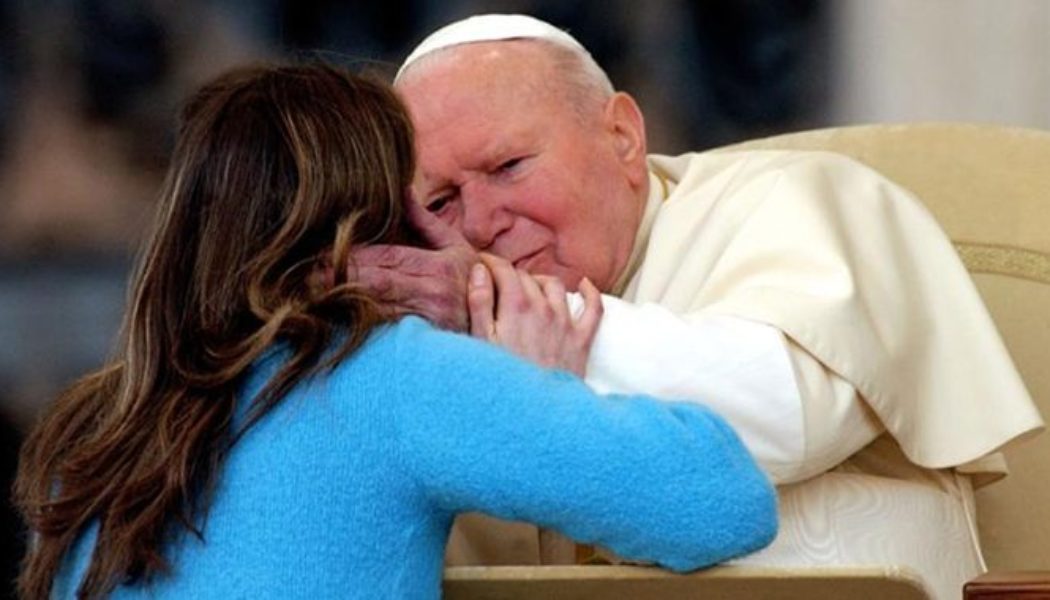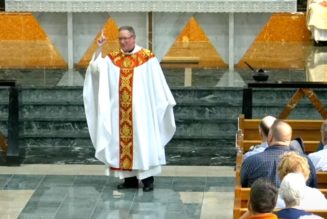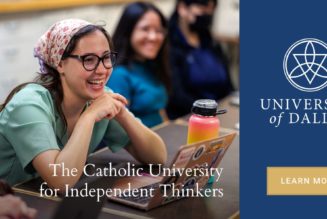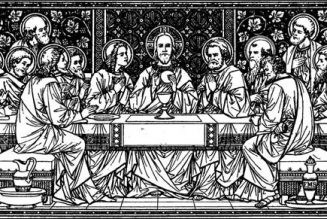
Yesterday, in the name of equality, many progressive voices demanded that women be permitted to act as men, regardless of how corruptly men might act. Today, in the name of equality, these voices say men must be permitted to attempt to become women.
The predominant anthropological views of those currently driving the messaging of most forms of popular media would likely shock even the German nihilist philosopher Friedrich Nietzsche, amidst his imaginings of the endless possibilities of what man could become after throwing off the shackles of Christian society. He would surely be appalled that his Ubermensch, after killing the Christian God would choose to become a neurotic member of the opposite sex.
St. John Paul II died almost two decades ago. By the time he had died, it was still politically impossible for candidates for major office in the United States to advocate for so-called “gay marriage.” In those bygone halcyon days, the inability to accept one’s sex difference as manifested by one’s body was still understood to be a disorder by most. The voices of confusion about what it means to be a human person have gained the ascendency relatively quickly in last twenty years, which could be indicative of reaching an endgame. While the saint would certainly have been distressed at the extremes which we have reached, I suspect he would not have been surprised.
An expert in the human person
St. John Paul II may have been the greatest expert on the human person among those who have graced the chair of St. Peter. His profound interest in the topic of human personhood arose from a confluence of his early experiences, none so formative as the dual nightmares he lived through, which wakened him to the threat posed to civilization by the fetid fruits of mistaken notions about personhood arising from the ivory towers of academia. These two nightmares were German National Socialism and Soviet Universal Socialism, both of which effectively reduced the person to his value to the State.
The soul-shattering experience of these human meat grinders, which were the product of profound philosophical errors about the human person arising from Modern and Post-Modern philosophies, fixed St. John Paul II’s focus on restoring an authentic anthropology to intellectual discourse. He recognized the remedy to the post-Cartesian reduction of human personhood would ultimately be a compelling theological account of the human person. To overcome the reduction of human personhood to a stream of consciousness, which had no permanence from which could come the capacity for life-long commitments, responsibility for the consequences of one’s decisions, or an enduring dignity beyond that which society deemed to grant him, one had to begin with an account of the person’s concrete existence and enduring essence.
Societal and personal consequences of the person cut loose and set adrift from his concrete, enduring existence and dignity continue to be grave. In the 20th century it was the short circuiting of a predominant Christian ethos that permitted the systematic annihilation of millions in Nazi concentration camps, perhaps tens of millions in communist reeducation camps, and today it results in hundreds of millions worldwide each decade through abortion. The abortion carnage continues with the CDC now estimating 73 million worldwide abortions annually. Those left to live also suffer the consequences of a corrupt reduction of the human person, which have left a society so broken that even Renate Nyborg, one of the creator’s of the hook-up app Tinder, was moved to try to fight what she sees as a public health crisis of loneliness by creating an AI-based relationship app. Unfortunately, lacking an adequate anthropology, it is unlikely this effort will prove helpful. The current relationship crisis is first a spiritual crisis. Only spiritual beings can have relationships, which are rooted in the spiritual faculties.
Human fulfillment versus concupiscent desire
The two spiritual faculties unique to persons are the intellect and the will. The intellect is that faculty by which we know, understand, reason, make judgments, and discern truths. The end of the intellect is ultimately fulfilled by authentically knowing God and other persons. The will takes the fruits of the intellect to choose authentic human goods. The ultimate human good is the choice to love. Love of God is to give ourselves completely over to actively choosing His will. Love of other persons is choosing and acting for their integral good. The purest love is willing and acting for the good of the other with no regard to self-benefit. An account of the dynamic, person constituting fruits of this drama grounded in a stable metaphysics is needed to convince contemporary thinkers to reconsider what the abandonment of the Christian patrimony about human fulfillment has wrought. Otherwise, today’s decadent understanding of love and human fulfillment will continue to dominate our societal ethos.
The Catholic anthropological patrimony had bestowed on Western civilization a reverence for truth and for the freedom to pursue the common human good through a life of virtue revealed by this truth. Contemporary society has set aside authentic human fulfillment and replaced it with the pursuit of concupiscent desire. For a time, the social guard rails which had been built over centuries of Christendom had endured. But the Christian ethos that remained in Western societies was on the decline resulting in an increasingly unbridled hedonism.
Yet because of what remained of this ethos, the hedonist ethic initially seemed to be all upside. With exponential growth in demand for consumable goods and services of convenience and pleasure we had booming economies and unrivaled wealth, in which the poor were also generally being provided for. Now that those societal guard rails have all but been demolished, the downside is only starting to be recognized. We have seemed only lately to awaken and find that Western society increasingly fragmented and fractious. Vast numbers of persons are coming to realize they are spiritual, moral, and emotional wrecks.
The consequences of this wreck for persons have been considerable. The wreck of the guard rails has led to several generations of increasingly lost people. More people are coming to understand they have a tenuous grasp on the meaning of life and who they are, and they increasingly doubt whether a pathway to human fulfillment even exists. Too many do not understand they were made for more than consumption of human goods and pleasurable experiences, and they still do not recognize they have been misled about life’s priorities. Most still have not yet come to see their understanding of reality is completely upside down. They do not know that they cannot change what they are, that their human nature is given and immutable. Too many are near despair about their lives and are tempted to believe the pathway out of their malaise is to opt out of humanity and become something else. For example, becoming a “furry” is now considered something more than a humorous option.
Yet, this societal decay negatively affects people of faith. In my ministry, I find so many who take their Christian faith seriously but who are so wounded and broken they seem unable to live flourishing lives or harmonious relationships. Indeed, I tell my young formation couples who are in courtship or engaged that while there has never been a golden age for relationships since Adam and Eve, I do not believe there has been a more difficult time.
There is a pathway to human fulfillment and it does require change, but it is not in changing one’s human nature that exists the change which man seeks. It is in changing who we are that we will find fulfillment. This change is indeed a necessary aspect of our essence. But to describe it adequately, we need St. John Paul II’s account of personhood because his anthropology opens the space for understanding necessary distinctions. As an aside, providing information explaining the pathway is no longer sufficient, transformation through integral human, spiritual and integral formation is needed for every Christian. But this integral formation must be developed from an adequate anthropology beginning with the concreteness of human personhood, and it must be speculative, practical and applied.
Recovering the permanent self
The lost sense of a permanent self contributes to the misbelief that one cannot possibly be expected to be held to long-term commitments, certainly not to those which are lifelong because one is not the same person from moment to the next, much less from one stage of life to the next. If there is no permanent self to form and perfect, then the current nihilism which reduces life to the movement from one experience to the next makes the assumption that life is about the satisfaction of concupiscent desire after concupiscent desire seem to be an unquestionable dogma to all too many.
John Paul II was emphatic that to overcome this societal downward spiral we must recover an authentic understanding of the human person. Central to an authentic anthropology is recognizing there is an aspect to the essence of the human person which is concrete and unchangeable. But at the same time, there is an aspect of personhood that can and must change, and this also belongs to personhood’s very essence. For classical philosophers, this would seem strange because essential change means discontinuity in the world of “whats,” that is, of natures. However, there is room for development in thinking about essence and personhood using a different category of being, and this development is now urgent.
The concrete permanence of the person is the very core of oneself, the subject who possesses his body and soul, that is his human nature. The concrete person is that self-same subject whom God knows from all eternity. It is this same person who begins his existence with his conception, who is born into the world, and who lives, dies, and meets his particular judgment. It is the concrete person that is the subject who encounters God and other persons, and who is responsible for his choices and actions. The person is the subject who is worthy of praise or condemnation, of glorification or damnation. But there must also be room for the essential change of who one is.
Providing an account for the essential change of personhood is central to articulating the drama of human fulfillment, and this is especially needed for today’s sensibilities. We must be able to explain the Christian command to live a life of virtue and holiness beyond the purely prescriptive if we are to attract today’s lost and disaffected, and if we are to keep many of the baptized and raised in the faith from surrendering to the siren song of contemporary hedonism. Tradition tells us this fulfillment is ultimately grounded in what St. Thomas Aquinas called the actus humanus, the human act.
St. John Paul II, Thomism, and the interior drama
The human act is one which is freely chosen based upon knowledge about the act’s goodness or evil. The Thomist tradition explains the effects of such choices “register” as accidental forms inhering in the soul. This is true, but by itself it does not provide insight into the drama of the person as St. John Paul II describes it. He recognized that contemporary man is not satisfied by classical formulations that do not seem to account for the interior dynamisms of human experience and its relationship to personal fulfillment. John Paul paved the way for articulating the fulfillment of human personhood in terms of changing the essence of who we are, through our choices of authentic love in the direction the tradition calls holiness. Choices in the opposite direction change the essence of our who-ness in the direction we call evil. The contemporary intuition that we can fundamentally change ourselves through our choices in the most dramatic of ways is not completely wrong, but it is distorted.
St. John Paul II employed a relatively new philosophical approach to understanding and describing this interior drama, called phenomenology. But he recognized that phenomenology needed to be grounded in and adapted to Thomist anthropology for maintaining the concreteness of personhood. He did not provide a systematic description of his integration project, but he did give hints at what the description must be in his manifold writings which applied the fruits of his Thomist-phenomenological anthropology. Indeed, his anthropology cannot be adequately understood without having a handle on this project. The project’s results provide an account of the permanence and dynamisms of personhood and personhood’s relationship to sex difference. But they also point to the need to look again at St. Thomas Aquinas’ initial account of human personhood as a mode of substance (see de Potentia, q.9, a.2, ad 6.).
St. John Paul II’s anthropology does not contradict the Angelic Doctor on this matter, but it does point out the need for further metaphysical development with respect to human personhood. To leave the account of the human person as a mode of substance does not permit an adequate, compelling account for the simultaneous concreteness of personhood and its dynamic essence. In itself, person as a mode of a substance seems to beg the question about the source for such a mode. It actually suggests the subject must be found in something more substantial than solely the modulation of substance. The role described for person as subject hints at some unarticulated, deeper reality that constitutes the very center of the being (ens). Neither does person as a mode of substance provide for a compelling account of the person constituting character of sex difference, leaving sex difference as nothing more than an accident inhering in the soul. In St. Thomas’ time, the lack of an adequate account of sex difference was not a problem that compelled a more complete articulation. Today the accidental character of sex difference seems to permit as plausible, many fanciful, contemporary theories about gender.
In the last century, Thomists have begun to reconsider St. Thomas’ use of the analogia entis using contemporary tools of investigation (e.g., Erich Przywara and Ferdinand Ulrich). In the spirit of this movement, I would like to suggest that the analogy of being would seem to demand we seriously consider human personhood in the category of being of relation, something serious Catholic scholars began to investigate last century (e.g., Joseph Ratzinger, Jean Galot, and W. Norris Clarke). St. John Paul II’s anthropology comports well with this theory, but I would argue it at least requires another look be given to providing a better metaphysical account of human personhood and sex difference. I have taken the first steps in this direction in my new book from Emmaus Academic Viri Dignitatem, which delves into St. John Paul II’s works to develop a systematic understanding of his view of personhood, masculinity, and fatherhood.
Make no mistake about it, the forces behind the meat grinders of the 20th century are impatiently awaiting an even more cataclysmic comeback. The ivory towers of academia continue to foster corrupt philosophies about the human person and to indoctrinate a good part of young minds with their person annihilating consequences. Justifications for such unconscionable choices such as abortion and so-called “sex reassignment” procedures used by some not insignificant quarters of academia and by many of those formed by these academics play an enabling role in the carnage now foisted upon innocent human beings and provide a game plan for the agents of a contemporary cataclysm. This is a blaring warning that the intellectual challenge contributing to the crisis of the human person can no longer be ignored.
St. John Paul II, pray for us!
If you value the news and views Catholic World Report provides, please consider donating to support our efforts. Your contribution will help us continue to make CWR available to all readers worldwide for free, without a subscription. Thank you for your generosity!
Click here for more information on donating to CWR. Click here to sign up for our newsletter.









